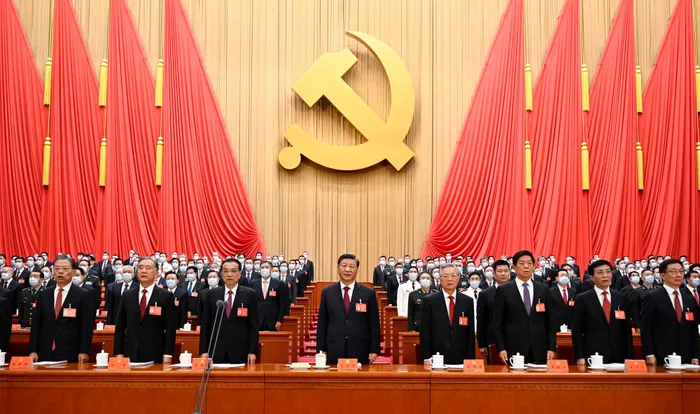Xi entrenches power, China poised for global dominance

Picture: EPA - Chinese President Xi Jinping, centre, with members of the Political Bureau of the Communist Party of China Central Committee, during the opening ceremony of the party’s 20th National Congress in the Great Hall of People in Beijing this month.
By David Monyae
The 20th National Congress of the Communist Party of China (CPC) concluded on Saturday, October 22 having started on October 16. This year’s congress is being held under the theme “Hold High the Great Banner of Socialism with Chinese Characteristics and Strive in Unity to Build a Modern Socialist Country in All Respects”.
The theme essentially captures the agenda of the CPC in the medium to long term. On the opening day of the congress, the General Secretary of the CPC, who is also the President of the country, Xi Jinping, delivered the political report of the 19th Central Committee as per tradition.
The political report is one of the most important items on the agendas of the congress as it takes stock of the performance of the party and the country in the last five years. The report also sets the agenda of the party in the following five years and beyond. In his report, President Xi pointed out what the CPC and the government it presides over had achieved in the past 10 years that he has been in power.
He described the past 10 years as the first decade of the journey towards “Socialism with Chinese Characteristics in the New Era” which has become his ideology. Some of the major achievements he trumpeted include doubling China’s GDP from 54 trillion yuan to 114 trillion yuan.
The GDP per capita was also doubled from 39 800 yuan to 81 000 yuan which contributed immensely to the eradication of poverty. The Xi administration managed to complete the eradication of extreme poverty by improving the incomes and well-being of 100 million people mostly in the rural areas who were still living under poverty.
Vowing to “offend a few thousand rather than fail 1.4 billion” Xi praised his government’s anti-corruption campaign which saw government bigwigs being prosecuted for corruption cases. Moreover, the report mentioned the reforms that have been carried out in the CPC, the People’s Liberation Army (PLA) and the government in an effort to reassert the supremacy of the party, get rid of inefficient bureaucratism, and modernise China’s defence systems to enhance national security.
Xi lamented the lack of discipline, consistency, loyalty to the values of the party and greed which was affecting the ranks of the CPC. Moreover, the political report gave an account of China’s place and role in the international community emphasising peaceful development as the cornerstone of China’s foreign policy during his tenure.
The issue of China’s unification with the island of Taiwan and the principle of One Country, Two Systems regarding the self-administered regions of Hong Kong and Macau were also mentioned in the report. Xi proudly proclaimed that the CPC managed to accomplish its first centenary goal of building a moderate socialist country.
However, he acknowledged that the party still had a lot of work to do in modernising China’s defence, eradicating inequality in regional development, reforming the government and the Party, and now the task was to look into the future towards the realisation of the second centenary goal of building a great and modern socialist country by 2049, which coincides with the 100th anniversary of the People’s Republic of China (PRC).
The intellectual foundations of the New Era will continue to be Marxism which will, however, be adapted to Chinese national conditions. This endeavour will be underpinned by principles of common prosperity for all, material and cultural advancement, sustainable development, and peaceful development.
Xi also stressed the importance of the leadership of the party, socialism with Chinese characteristics, high-quality development, people’s democracy, and human community with a shared future as the pillars of China’s new era. Also notable were a set of economic proposals which include building a high-standard socialist market economy, modernising the industrial system, co-ordinated regional development, rural revitalisation and high-standard opening up.
If the reading of the political report is any indication, Xi has consolidated his power in the party, government and the military which will see his reign secured at least in the next 10 years. The party and the government have become more centralised, ensuring he has close control on government and party policy.
Moreover, under Xi’s presidency, China is poised to play a more active role on the international stage, propelled by the commitment to Chinese national rejuvenation.
Xi’s government is likely to make a more concerted effort to reclaim the Taiwan island as part of national rejuvenation. In addition to doubling down on the socialist economy and the Marxist philosophy with Chinese characteristics, the efforts to reclaim Taiwan will drive a wedge between the US and China.
As China bids for more global prominence in pursuit of the Chinese Dream, developing regions such as Africa will become key allies. Africa has a significant numerical presence in global platforms and is home to strategic resources that China needs to develop its economy – especially the agriculture and technology sectors.
*Monyae is an Associate Professor in International Relations and Political Sciences and Director of the Centre for Africa – China Studies at the University of Johannesburg.
Related Topics: